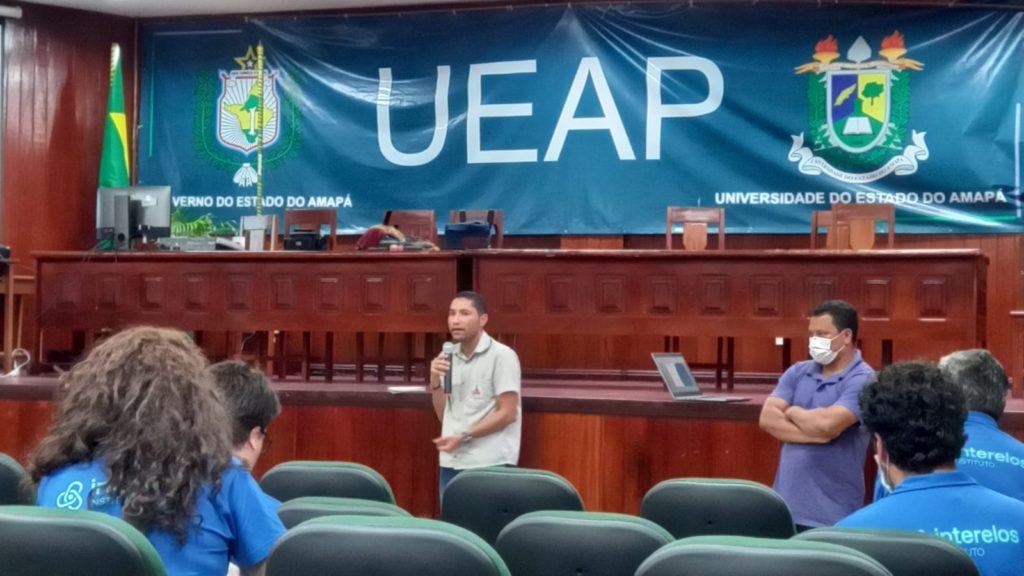The purpose of the meeting was to make an annual review of the Inclusive Community Economies Program
In the Bailique Archipelago, a group of eight islands at the mouth of the Amazon River, residents joined forces in the discussion of a community protocol in which, based on the definition of the açaí chain as a priority, they were able to create an enterprise capable of generating jobs and bringing development for the region through the sustainable production of açaí.
THE amazonbai is the result of that effort. With the work of açaí producers and the help of partners, the cooperative bought the equipment and structured its production in a rented agro-industry to produce the açaí pulp, which will be sold in different markets.
Meeting in Macapá
A few weeks ago, the Instituto Interelos team, which has supported the cooperative throughout its trajectory, was in Macapá, in the state of Amapá, to join Amazonbai members and other supporters in a large annual meeting.
The purpose of the meeting was to take stock of the Inclusive Community Economies Program, supported by the JBS Fund for the Amazon, and review the goals of everyone involved. The program brings together six partners who have been working in the Bailique region.
“This entire process is built together with the cooperative members, in a collective construction”, says the co-founder of the Interelos Institute, Marcos Tadeu, who was present at the meeting.
For him, the occasion was an opportunity to see what has been done so far and align goals for the future. “Basically, we want to strengthen and expand the açaí production chain in the Amazon in a sustainable way, and that is the main objective of the program”.

A history of achievements
Tadeu explains that the program has several action fronts that “involve both actions aimed at the production, industrialization, commercialization and treatment of açaí waste, as well as there are fronts aimed at the development of human capacities and financial support of family schools.
During the meeting, a survey was made of the initiatives carried out so far, especially the main achievements. Highlighting the inauguration of the agroindustry, the closing of the first commercialization contracts, the certifications obtained, as well as the formatting of a fund to support regional education.
It is also worth mentioning the initiatives to develop products with greater added value, access to new markets and new partnerships. Emphasizing the importance of certifications in this process (Vegan Product Seal and the Forest Stewardship Council-FSC®, recognized worldwide). This is the first açaí in the world to be 100% certified by the FSC®, which gives credibility to the product and signals to investors and consumers that the enterprise takes sustainability seriously. This commitment is reflected in the sustainable management of the forest, which is carried out through the implementation of good management practices with minimal impact, production without pesticides and fertilizers, respecting work safety standards and a maximum amount of açaí trees in the middle of the forest. .
The next steps for the açaí program in Amapá include obtaining organic certification and installing equipment that will allow the Amazonbai cooperative to reach more exclusive foreign markets.
Tadeu also highlights the development of a Fund for the financial support of the Family Schools (Agroecológica do Macacoari – FAM and Escola Família Agroextrativista do Bailique – EFAB). The Agricultural Family Schools are a model based on the pedagogy of alternation, where students alternate between periods at home and periods at schools, where they also learn management techniques and good agro-extractive practices, which can be applied in their communities.
But the difficulty of financing has been an obstacle to its maintenance, as Tadeu says. "These schools depend on government money that sometimes comes in and sometimes doesn't." To solve this problem, it was created an endowment fund, the FUTURE (United Territories Fund for Education Resources), which will be launched next year.
Thinking about the future
In addition to taking stock of the past, it was also an opportunity to discuss plans for the program's future. “We saw what was done and what needs to be adjusted in this period and we carried out a realignment of goals, thinking about actions that can be carried out jointly between the partners”, says Tadeu. According to him, there are complementary actions that can be put into practice in a most coordinated among the Program partners.
In the end, however, the balance of the meeting was positive, as the partners were excited about the progress of the project. “One of the main conclusions is that we will continue to contribute resources to this program in the coming years, which until now has been successful”.
With the launch of heritage fund in 2023, another important step will be taken towards the development of the territory, and the planned actions intend to continue identifying opportunities and bottlenecks and carrying out interventions in the different links of the açaí chain produced by Amazonbai. There are also plans to replicate and expand this enterprise model to other territories in the Legal Amazon.
Through this project, the cooperative members and their supporters show that it is possible to gain scale and develop sustainable enterprises with planning, cooperation and the protagonism of those who inhabit the region.
